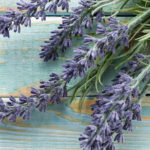Home
The best herbs and essential oils for sleep
Up to a third of us suffer from insomnia, according to a 2011 report by the Mental Health Foundation. A good night’s sleep is vital to allow the body to recuperate while the brain consolidates memories and information you’ve learnt from the day. But when we’re tossing and turning in the small hours of the morning, remembering the importance of sleep can sometimes keep us up even later, worrying about when we will drift off. Certain essential oils may be helpful in these situations, as many are thought to have relaxing qualities that could soothe us into sleep.
Read on to find out which essential oils we should add to our bathroom cabinet to help us drift off – after all, a hot bath or facial steam is far preferable to counting sheep.
Lavender for rest
Lavender is perhaps the best known essential oil for promoting a restful night’s sleep, with its soothing, reassuring aroma. A study in the journal Chronobiology International, found that lavender can act as a mild sedative, increasing deep (slow-wave) sleep, but resulting in higher rigour the following morning. Using a lavender based pillow spray, or keeping a tissue with a few drops of lavender oil under the pillow may be just what is needed to enjoy a deeper sleep without feeling sluggish the next morning.
Jasmine for stress relief
Jasmine oil is thought to be an effective stress reliever. One study found that inhaling jasmine can have a sedative effect which calms anxiety and encourages sleep – the research suggested that, in their study, the jasmine oil worked as effectively as medical sedatives. Jasmine essential oil can be expensive, but its heady floral aroma is potent enough that you need only use a tiny amount. It can also be blended with other floral oils like geranium and rose. This herbal steam facial is not only great for our skin, it is also an effective way of benefitting from the essential oil’s relaxing properties through inhalation.
Lemon balm for relaxation
Lemon balm, or ‘melissa’ is a wonderful herb whose leaves release a delicate lemon-like fragrance when rubbed between the fingers. Its fresh leaves can be brewed into a zesty, refreshing tea, or it can be administered in extract form or as an essential oil. Lemon balm is known for its sedative properties. One study found that taking lemon balm extract ameliorated the negative moods experienced as a result of laboratory-induced stress and elevated feelings of calmness.
Roman camomile for sleep
Camomile tea has long been drunk before bedtime to induce a state of drowsiness – remember Beatrix Potter’s Mrs Rabbit giving Peter “one table-spoonful to be taken at bed-time”? While more research needs to be undertaken to confirm this, studies have shown that consuming camomile extract can have a sedative effect, which improves sleep quality in elderly patients. While it is by no means a cure for insomnia, research has found that camomile could improve the daytime functioning of chronic insomniacs with some moderate effects on the severity of fatigue, how long it took to drift off, and night time awakenings.
As well as being a good excuse to treat ourselves to a beautifully fragranced bath or steam facial, the evidence does suggest that the essential oils of certain herbs and flowers may indeed improve our sleep quality, and at least help us to relax.






